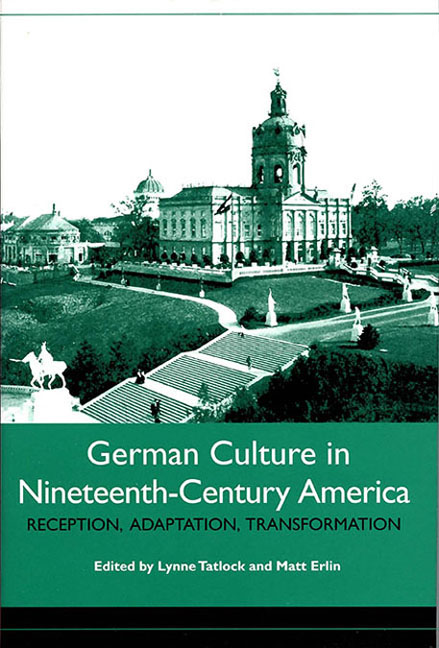Introduction
Published online by Cambridge University Press: 13 April 2017
Summary
This collection of essays examines the circulation and adaptation of German culture in the United States during the so-called long nineteenth century, the century of mass German migration to the New World, a century of industrialization, new technologies, American westward expansion and Civil War, German struggle toward national unity and civil rights, and increasing literacy on both sides of the Atlantic. Stimulated by ever greater mobility, communication, and the consequent increase in the flow of information in both directions, the denizens of both continents regarded the other with curiosity and envy, and in many geographical regions on both sides of the Atlantic it would have been difficult to find someone who did not know a person from a German territory who had emigrated/immigrated to the United States. We are, however, not interested so much in American images of Germany or vice versa as in the processes themselves by which Americans took up, responded to, and adapted German cultural material for their own purposes. The essays included here focus on such critical issues as translation, on the adaptation of German ideas and educational ideals in various public forums and institutions, on the reception and transformation of such genres as serialized crime fiction and the encyclopedia, and on the status of the “German” and the “European” in celebrations of American culture and criticisms of American racism.
In short, we are interested in “Americanizing,” in means and modes of transfer, and in the creative adaptation in local, regional and national settings in the United States of cultural material that emanated from the German-speaking territories in Europe. In twentieth-century studies, “Americanization” is largely understood as the flow of American ideas, values, money, and products into Europe, indeed, even as a colonizing of the German unconscious (Wim Wenders, Kings of the Road). We, in contrast, are looking at nineteenth-century “Americanization” as a productive re-signification, transformation, or re-packaging of German ideas, values, and products in the United States.
- Type
- Chapter
- Information
- German Culture in Nineteenth-Century AmericaReception, Adaptation, Transformation, pp. xi - xxiiPublisher: Boydell & BrewerPrint publication year: 2005



